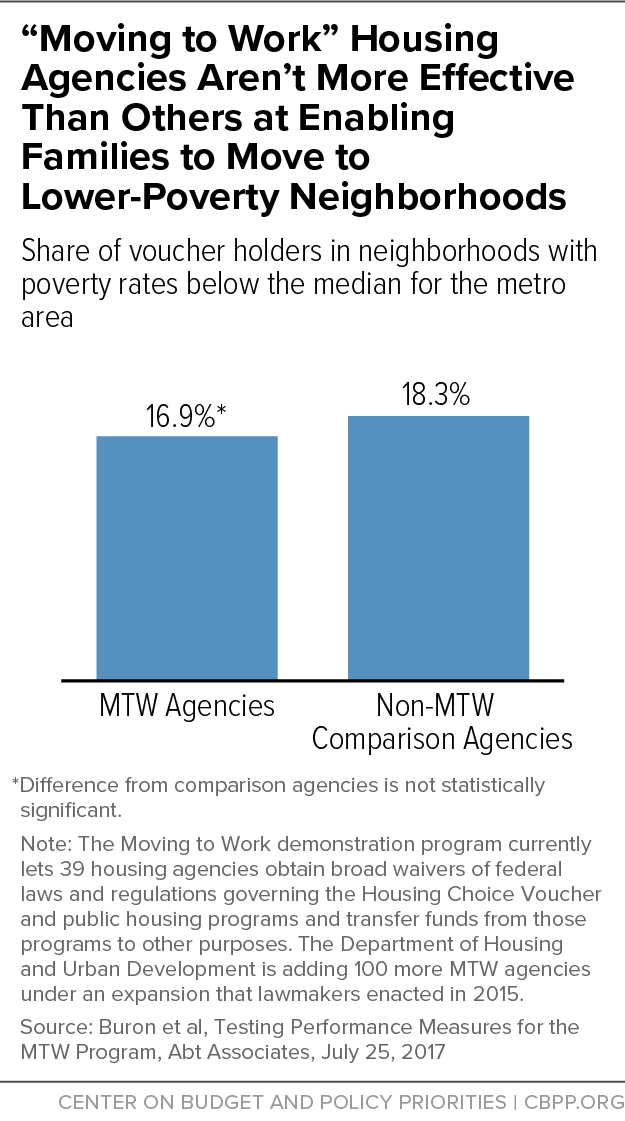BEYOND THE NUMBERS
“Moving to Work” Housing Agencies No Better Than Others at Helping Families Move to High-Opportunity Neighborhoods
The Department of Housing and Urban Development’s (HUD) Moving to Work (MTW) demonstration program hasn’t helped families rent housing in low-poverty areas with low-crime and strong schools, a recent report shows.
Moving to such neighborhoods can have powerful long-run benefits for children, and the Housing Choice Voucher program should do much more to broaden housing choices for families. But rather than expand MTW further — which would pose many risks to low-income families — policymakers should help and encourage all state and local housing agencies to expand low-income families’ access to high-opportunity neighborhoods, and enact and effectively implement a new demonstration to support and test mobility policies.
MTW lets 39 housing agencies obtain broad waivers of federal laws and regulations governing the Housing Choice Voucher and public housing programs and transfer funds from those programs to other purposes. HUD is adding 100 more MTW agencies under an expansion that lawmakers enacted in 2015, and some have called for expanding the demonstration even more.
One of MTW’s statutory goals is to expand housing choice for low-income families, and some MTW agencies — such as Baltimore, Chicago, and King County (WA) — have instituted well-regarded housing mobility initiatives. But overall, MTW agencies haven’t been more effective at enabling families to move to low-poverty neighborhoods than similar non-MTW agencies, according to the report, which was commissioned by organizations affiliated with local housing agencies (see graph). In addition, MTW agencies use their flexibility to divert hundreds of millions of dollars a year from the voucher program, a practice that each year denies tens of thousands of families access to the opportunities that vouchers can provide.
One reason that MTW doesn’t help families move to lower-poverty areas is that the most promising housing mobility policies don’t require MTW deregulation. All housing agencies, for example, can give voucher holders adequate time to search for housing (which can take longer in desirable neighborhoods) and set voucher subsidies higher to help families rent in high-opportunity neighborhoods, and all must provide them with lists of available units outside high-poverty areas. MTW also has no bearing on state and local governments’ ability to ban landlord discrimination against voucher holders. And while MTW agencies can use funds they divert from the voucher program to pay for housing search assistance and other mobility-related services, more than a dozen non-MTW agencies have also found ways to institute mobility programs by using other funding sources that don’t cause fewer families to receive vouchers.
In addition, MTW flexibility has let some agencies institute policies that limit access to opportunity. For example, a HUD regulation that took effect in 2018 requires housing agencies in 24 metro areas where voucher families are unduly concentrated in poor neighborhoods to use Small Area Fair Market Rents — a policy that ties voucher subsidies more closely to neighborhood rents and which, research indicates, helps voucher holders move to higher-opportunity areas. Most MTW agencies in those areas have used their flexibility to opt out of that requirement, however, and about half set the amount of rent that a voucher can cover in high-rent areas well below the level that would otherwise be permitted. Some MTW agencies also have used their flexibility to restrict the legal right of voucher holders to move outside the jurisdiction of the agency that issued their voucher, as families often must do if they wish to move with a voucher from a central city to a higher-opportunity suburb.
Rather than add even more agencies to MTW, policymakers should give all state and local agencies stronger incentives to help families move to high-opportunity neighborhoods and strengthen their available tools to do so. Most immediately, the President and Congress should ensure that 2019 HUD funding includes the new housing mobility demonstration (as the draft appropriations bill that House and Senate negotiators crafted does). Policymakers should also institute reforms to MTW that limit the diversion of voucher funds and block waivers that constrain families’ housing choices.

